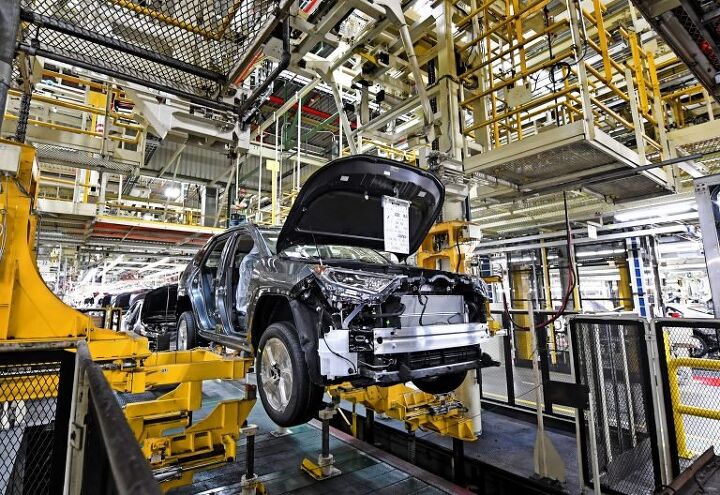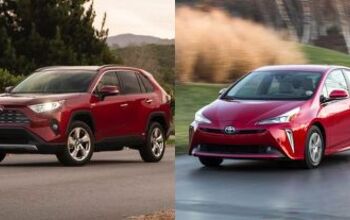Fluke? Electrified RAV4 Outsells Normal RAV4

Please don’t send us emails complaining about the use of the word “normal” in a headline. Yes, the Toyota RAV4 Hybrid is still a RAV4. Yes, it has every right to exist, and it makes its parents proud, each and every day.
Especially lately, given that the electrified version of the country’s top-selling compact crossover outsold its conventional sibling in June. Not that the hybrid RAV4 was a sales slug to begin with.
As Tim Cain told you late last year, the RAV4 Hybrid has pretty much replaced the once dominant Prius as the green car du jour in the Toyota lineup. And for whatever reason, June saw the RAV4 Hybrid beat out the gas-only RAV4 by nine units last month, Automotive News reports. There’s a first time for everything.
The 17,051 RAV4 Hybrids sold in June is a far cry from June 2019’s 9,013 units, or even the roughly 10,000 sold in December. But it seems more than likely that circumstance tilted the scales in the hybrid’s favor on a temporary basis.
As we noted last week, inventory data showed Toyota with the thinnest stock of all automakers at the end of June. According to Cox Automotive figures, Toyota’s average 30 days’ supply of vehicles was the least bloated in the industry, vastly undercutting the overall average of 70 days. Take a stable of mostly hot-selling vehicles, add a two-month U.S. production shutdown, then a not-immediate ramp-up, and try to come up with another result. It’s quite possible the dealer cupboard was close to bare in June, tamping down conventional RAV4 sales like an afternoon rain shower on a grass fire.
The same result could crop up in July.
Indeed, AN reports that some dealers marked down RAV4 Hybrids in June to compensate for their lack of of gas-only models. That said, the RAV4 Hybrid’s enviable fuel economy and sensible pricing ladder has earned the variant a consistent sales following, meaning dealers can be assured of steady volume regardless of which model they stock their lots with. Moving up to a hybrid variant in the absence of a purely internal combustion model isn’t a confusing or expensive step for an open-minded customer.
While overall sales are down across the industry, Toyota hybrids saw an uptick of 14 percent over the first half of the year, with more than half of the brand’s electrified vehicles sold being RAV4s. The plug-in hybrid RAV4 Prime arrives this summer to add further choice for green shoppers, though Car and Driver noted recently that battery supply issues could see this year’s American take of the PHEV model fall short of initial expectations.
It could be a while before the RAV4 Prime adds meaningful volume to Toyota’s U.S. sales sheet, though full production of the conventional model and continued production of the regular hybrid should eventually brighten the sale picture.
[Image: Toyota]

More by Steph Willems
Latest Car Reviews
Read moreLatest Product Reviews
Read moreRecent Comments
- Jeff When Chevrolet started offering vehicles with features that were exclusive to Cadillac and Buick and Cadillac cheapened their cars to chase volume that was the beginning of the decline of the Cadillac brand. The same thing holds true for Ford and Lincoln. No compelling reason to buy the luxury brand over the lower tiered brand when the lower tiered brand can be comparably equipped for thousands less.
- Lou_BC On a different note, I read that 30% of the world's energy is now generated by "renewable" sources.
- Kjhkjlhkjhkljh kljhjkhjklhkjh not surprised their grid is as terrible as ours ...
- Lou_BC EV's are a convenient foil. Cadillac has been searching for its place. Are are they luxury performance? In your face audacious? Do they offer prestige? What sets them apart from the rest of "the look at me I'm special" vehicle market? I can buy a Denali SUV or pickup with similar luxury.
- Cprescott No big loss. It was always third rate when there was competition. At best its only good point was its price point.



































Comments
Join the conversation
If people won't pay $900 for a hybrid, they will never pay up, in mass, for BEVs, which are now about $10,000 more expensive, Toyota's mature hybrid system provides over 1/2 the purported benefits (primarily gas milage) of a full electric. The fact that they just aren't popular indicates that the "inevitable" move toward electrification isn't getting traction. "Toyota said Wednesday(in 2019) it will give royalty-free access to its nearly 24,000 patents related to electrification ..." Now Toyota is throwing in it's hybrid option for free and finally getting takers. Toyota is behind in the full electric segment, and making a last ditch attempt to popularize hybrids. I can see people gladly adopting for free, but not even $3,000.
I am not totally surprised. I was pretty committed to a gas powered Rav4, but on the test drive I was pretty underwhelmed by the powertrain experience. It was ok... but just not great... the engine seemed loud but not too powerful, transmission was not that smooth, and steering was too light. Strange because it has the same or similar engine/transmission to the Camry which I think drives pretty great in its current form. So that might drive many to the Hybrid, not to mention fuel economy. But in my case, the Hybrid had waiting lists, high financing rates, no deals... so I moved on.